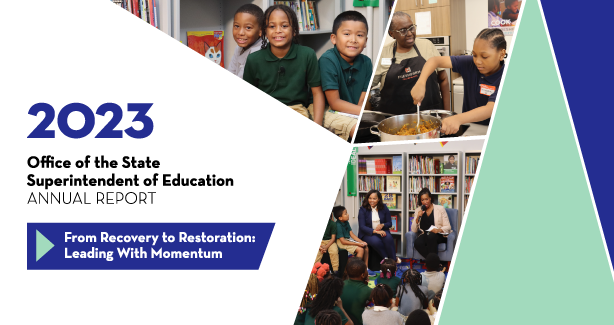 Healthy bodies and minds are the foundation of academic success. OSSE leverages programming, partnerships, policy and data to remove health barriers to learning so that people of all ages and backgrounds are prepared to succeed in school and in life. In 2023, OSSE adopted new Menstrual Health Education Standards for LEAs, offered educators mental health supports and suicide prevention training, hosted an institute to equip educators with the information they need to provide quality garden-based education, and leveraged grant funds to improve school climate through a variety of supports.
Healthy bodies and minds are the foundation of academic success. OSSE leverages programming, partnerships, policy and data to remove health barriers to learning so that people of all ages and backgrounds are prepared to succeed in school and in life. In 2023, OSSE adopted new Menstrual Health Education Standards for LEAs, offered educators mental health supports and suicide prevention training, hosted an institute to equip educators with the information they need to provide quality garden-based education, and leveraged grant funds to improve school climate through a variety of supports.
Adopting First-in-Nation Menstrual Health Education Standards
Following the passage of the Expanding Student Access to Period Products Act of 2022 by Council of the District of Columbia in March 2022, OSSE developed menstrual health education standards for all. These standards, adopted in March 2023 by SBOE, are intended for all students regardless of gender beginning in grade 4, ensure that students have the information, support and enabling school environment to manage menstruation with dignity, safety and comfort. OSSE also created a range of supplemental resources for schools to increase student access to period products to increase awareness and education, as well as to decrease stigma around menstruation. Our first-in-the-nation, inclusive, science-based standards are a model for other states, including state boards of education, and were featured in the Washington Post, as well as in local and national news.
Providing Mental Health Supports and Suicide Prevention Training
OSSE’s Division of Health and Wellness offers suicide prevention and intervention curriculum and training to every DC public and public charter school. The Yellow Ribbon “Be ALink! Community Gate Keeper Training,” for elementary schools, and the MindWise Signs of Suicide (SOS), for middle and high schools, seek to create safe schools where staff can recognize warning signs, risk and protective factors in youth, initiate conversations about suicide, and take appropriate supportive actions. Students also develop tools to identify signs of depression and suicide in themselves and their peers and understand and express their behavioral health concerns with trusted adults.
In FY23, 209 schools had at least one educator attend a training. In total, approximately 279 educators attended more than 12 Yellow Ribbon training sessions, and 264 educators participated in nine SOS training sessions. This training was supported with approximately $90,000 in ESSER funds.
Supporting School Staff to Create Safe and Healthy Learning Environments
The Division of Systems and Supports, K-12 awarded the Stronger Connections grant, which was funded by the Bipartisan Safer Communities Act, to 12 LEAs that will receive a total of $4.5 million in grant funds. These LEAs will use the money to expand mental health supports for students in 34 schools that serve more than 14,000 students in pre-K 3-grade 12. LEAs received awards for school-based projects such as improving data systems to track all students’ needs; providing social-emotional learning curriculums; professional learning for staff to improve school climate, such as trauma-informed and trauma-sensitive practices, restorative justice practices and family engagement; and creating emotional regulation spaces in school buildings.
Regional Summer Institute for Garden-Based Teaching
OSSE, in partnership with City Blossoms and the United States Botanic Garden, convened the 2023 Regional Garden-based Learning Summit in July. More than 50 participants, including 28 representing 21 schools, gathered in the District to create plans for the school year, learn outdoor teaching strategies, engage in activities with garden-based professionals and connect with regional peers. Participants gathered at OSSE on the first day of the summit to engage in workshops and trouble-shooting sessions to address common challenges of garden-based programming, followed by a day of hands-on experiential demonstration and activities. All participants reported greater awareness of garden-based learning programs in our region and 86 percent reported awareness of available resources to support their work. All participants also reported stronger connections with colleagues and planned to stay in touch with those they connected with at the summit. This regional summit was supported with ESSER funds.



